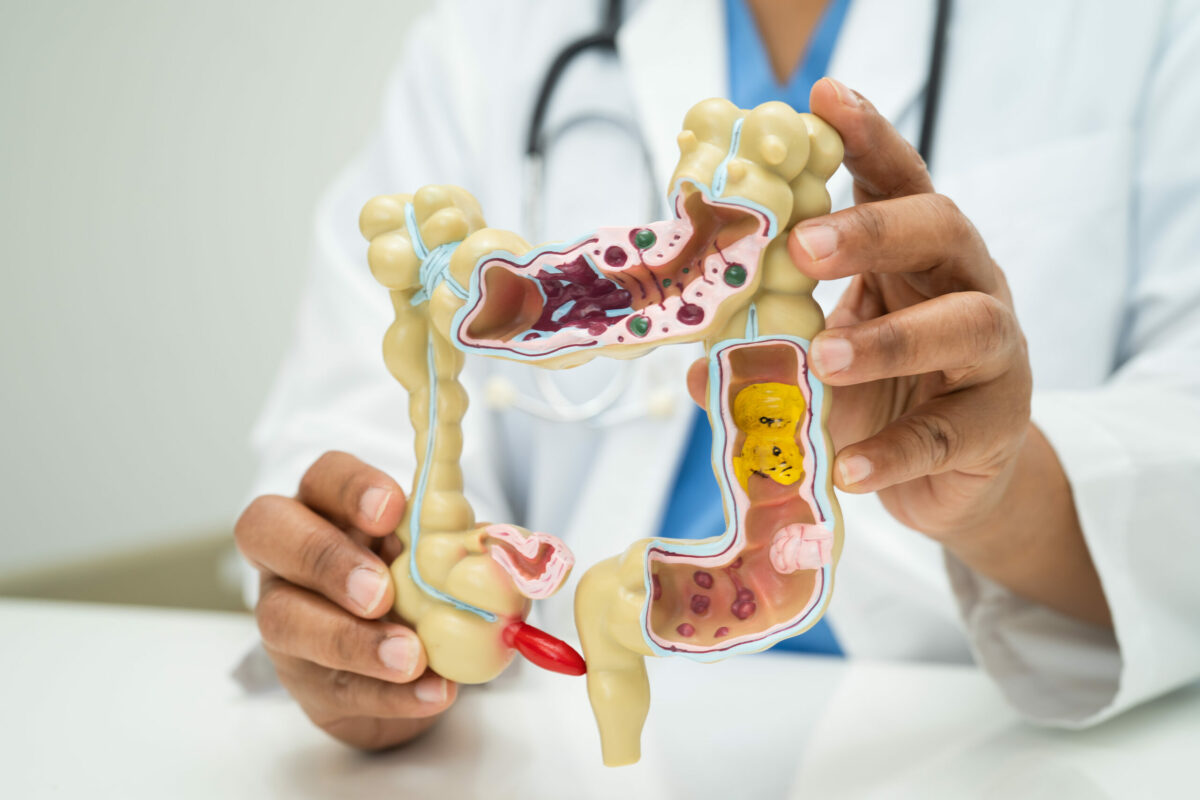The cancer type that begins in a part of the large intestine (also called the colon) is called colon cancer. The largest and longest part of the large intestine is called the colon. However, the large intestine is a part of the digestive system that breaks down the food.
In most cases, this cancer type occurs in older people, but it may occur at any age as well. Usually, it appears as small clumps of cells (also known as polyps) inside the colon. Generally, polyps are not cancerous, but some of them may turn into cancer in time.
People who have polyps in the colon often do not experience any symptoms. That’s why it is advised to have regular checkups to look for polyps. The only way to prevent colon cancer is to find and remove polyps.
However, if the cancer appears, there are multiple treatments available to control it. These include surgery, radiation therapy, chemotherapy, immunotherapy, and targeted therapy. In some cases, this cancer type is called colorectal cancer because it involves the colon and rectum at the same time.
Symptoms
In the early stages, colon cancer does not cause any symptoms. However, the symptoms appear usually when the cancer advances. Check below some symptoms:
- Rectal bleeding
- Bloody stool
- Abdominal discomfort (including cramps, pain, or gas)
- Bowel habit changes (including persistent diarrhea or constipation)
- Weakness
- Tiredness
- Unusual weight loss
If any of the previous symptoms occur and last for long periods, immediately visit a doctor for a diagnosis and treatment.
Causes
Healthcare providers do not know what triggers DNA changes that cause colon cancer. Thus, most colon cancer causes cannot be identified.
Generally, any cancer type occurs when DNA mutations (changes) happen. DNA contains different instructions that tell a cell when to grow, multiply, and die. When a person develops DNA mutations, it gives the cells other instructions that make them grow and multiply abnormally. When these abnormal cells become too much, they form a mass called a tumor that may invade healthy cells and destroy them. Moreover, cancerous cells live longer than healthy ones.
Without treatment, the tumor may break and spread to other body parts (such as the lungs). In such cases, it is called metastatic cancer.
Risk Factors
Anyone may develop colon cancer, but physicians identified some factors that may elevate your risk of developing it. Check below some examples:
- Age – The risk of cancer (including colon cancer) increases with age. People over 50 years old are more likely to develop this cancer type.
- Black race – In the U.S. Black people have an increased risk of developing colon cancer compared to people of other races.
- Medical history of colorectal cancer or polyps – If you have had colorectal cancer or polyps, it increases the risk of cancer recurrence.
- Inflammatory bowel diseases – The conditions that cause inflammation (swelling) and pain in the intestines may increase the risk of colon cancer. These include ulcerative colitis, Crohn’s disease, and others.
- Inherited syndromes – There are some abnormal genes that may pass from biological parents to biological children and increase the risk of colon cancer. Familial adenomatous polyposis and Lynch syndrome are the most common inherited syndromes that elevate the risk of colon cancer risk.
- Family history of colon cancer – If you have a parent or sibling with colon cancer, your risk of developing it increases.
- Low-fiber or high-fat diet – Colon and rectal cancer are associated with diets that tend to reduce fiber consumption and increase fat and calories. However, some studies have shown mixed results.
- Lack of physical exercises – People who do not perform physical exercises are more likely to develop colon cancer.
- Diabetes – People with excessive body weight or obesity also are at increased risk of this cancer type.
- Smoking
- Heavy alcohol drinking – People who drink high amounts of alcohol are at greater risk of developing colon cancer.
- Cancer treatments – If you are exposed to prolonged radiation (such as radiation therapy), the risk of colon cancer increases. Radiation therapy is a treatment used to treat cancer.
How to Prevent Colon Cancer?
In general, physicians recommend regular screenings for colon cancer around 45 years old, but if you are at increased risk of developing it, you should begin regular checkups sooner.
However, there are some tips that may reduce the risk or even prevent colon cancer. For example:
- Dietary changes – Add to your diet fresh fruits, vegetables, whole grains, and foods that contain minerals, vitamins, fiber, and antioxidants.
- Limit or avoid alcoholic drinks
- Quit smoking or never start. If you face problems with smoking cessation, discuss it with your healthcare professional.
- Regular exercise – It is advised to aim for at least 30 minutes of physical exercise per day.
- Try to get and keep a healthy weight because excessive body weight or obesity increases the risk of colon cancer.
In addition, there are some medicines that may reduce the risk of polyps or cancer of the colon. For example, there is some evidence that linked Aspirin use with reduced risk of developing polyps or cancer. However, it is not clear how much time and which dose you should take to reduce the risk. On the other hand, long-term use of over-the-counter (OTC) pain relievers also carries some risks including ulcers and bleeding that may happen in the digestive system. In any case, if you are at higher risk of developing colon cancer, you should consult with your doctor.
Diagnosis
Check below some tests and procedures usually used to diagnose colon cancer:
- Colonoscopy – This test involves a thin and flexible tube with a lighted camera on the end. It allows the doctor to see the entire colon and rectum. Moreover, during a colonoscopy, doctors may get a sample of the tissue for testing and remove polyps.
- Biopsy – This procedure involves the removal of a small affected tissue and testing it in the laboratory. It is checked under a microscope for cancerous cells. While the tissue sample usually is removed during a colonoscopy, some people need surgery to get the sample.
- Blood tests – These tests cannot diagnose colon cancer but may give multiple clues about your general health. For example kidney and liver function. Sometimes, cancerous cells may produce a protein (called a carcinoembryonic antigen or CEA) that may be identified by performing a blood test.
Additionally, once you are diagnosed with colon cancer, physicians may perform additional tests to determine the stage (extent) of the cancer. It helps make the best treatment plan for you.
Treatment
The treatments for people with colon cancer are often different because it depends on several factors. For example your age, existing health problems, the location and size of the tumor, and others. Check below some treatments according to the stage of the cancer:
Early-stage Colon Cancer
- Polypectomy (removal of the polyps during colonoscopy) – This treatment is used to remove very small tumors.
- Endoscopic mucosal resection – This procedure involves the removal of the larger polyps also during a colonoscopy.
- Laparoscopic surgery (also called minimally invasive surgery) – This procedure is used to remove polyps that cannot be removed during a colonoscopy. Laparoscopic surgery involves multiple small cuts in the abdominal wall.
More Advanced Colon Cancer
- Partial Colectomy – This procedure involves the removal of a part of the colon that has cancer. In most cases, surgeons also remove a part of a nearby healthy tissue. During partial colectomy, they also may reconnect the healthy part of the colon with the rectum.
- Ostomy – This treatment is used when it is not possible to reconnect the colon with the rectum. It involves an opening in the abdominal wall that allows the stool to leave the body. The stool is collected into a bag that fits the opening.
Advanced Cancer
In some cases, it is not possible to remove the cancer and surgeons will try to relieve the symptoms by removing blockages that may help with bleeding or pain. Physicians also may prescribe other treatments when surgery is not possible. The following treatments also are used when the cancer spreads to other body tissues and organs.
Chemotherapy
This treatment involves strong medications to destroy cancer cells throughout the body. In such cases, it is given to the patients to kill cancer cells that may remain after surgery or if the cancer is large and spread to the nearby lymph nodes. Chemotherapy is often given to people with colon cancer intravenously (IV) but a pill form also is available.
Sometimes, physicians may recommend chemotherapy drugs before surgery to shrink a large tumor.
Radiation Therapy
This treatment is used to destroy cancer cells by using powerful energy beams. This energy usually comes from protons, X-rays, and other sources. This therapy also can be used to shrink large tumors and sometimes it may be prescribed along with chemotherapy.
Targeted Therapy
This therapy involves specific medicines that block some substances in the cancer cells, causing them to die. Moreover, physicians may perform some tests to determine whether it will be effective for you or not. Some people require both chemotherapy and targeted therapy.
Immunotherapy
Generally, cancerous cells produce certain chemicals that help them hide from immunity. Immunotherapy involves some medicines that boost the immune system to fight against cancer cells. This treatment option is often prescribed for people with advanced colon cancer and other treatments do not work.
Frequently Asked Questions
What are the risk factors for colon cancer?
These include:
- Alcohol misuse
- Eating high amounts of red meat
- Low fiber diet
- Obesity
- Smoking
- Certain inherited genetic syndromes
- Family history of colon cancer
- Age (people over 50 years old are more likely to develop this cancer type)
Can colon cancer be cured?
Yes, especially if it is found in its early stages. When the tumor is small, surgeons will remove it during surgery or colonoscopy.
What is the survival rate for colon cancer?
The 5-year survival rate for this cancer type is approximately 90% if it is found in its early stages. However, the survival rate decreases when the cancer advances. If you have additional questions, ask your healthcare professional.




